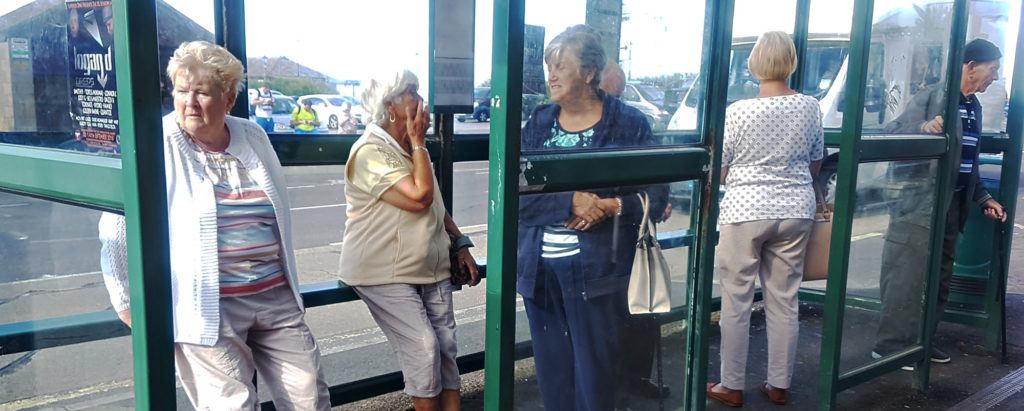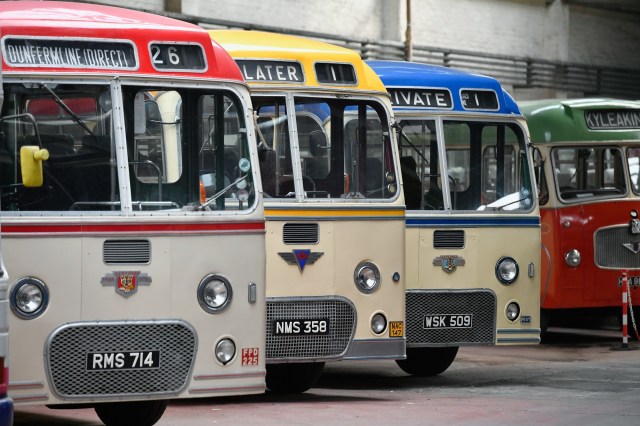Credit: by Jeff J Mitchell/Getty Images

“You’d think as we go forward things would be getting better, but they’re actually getting worse.” This pointed comment on the state of Britain’s buses came from Janice, a 73-year-old pensioner standing next to me at a windswept bus stop in the Somerset coastal town of Burnham-on-Sea.
Looking for a bus in the English countryside brings to mind the well-known aphorism about waiting for ages before two come along at once. Except, only the first part of this cliché holds true in any reliable sense: you certainly wait for ages, though a significant period of time usually elapses before a second bus arrives.
The dearth of public transport outside of England’s cities is shocking, especially for those accustomed to the comprehensive network that exists in London – where, of course, even when public transport lets you down there is typically a taxi close at hand (and you have the mobile phone reception to call one, unlikes many parts of rural England).
Having moved back to Somerset for the summer, I recently spent several days travelling around the county by bus in order to see how services compare to when I was growing up in the area. I live in a small village situated roughly half-way between Weston-Super-Mare and Taunton on the south west coast. There are shops located nearby – B&M Bargains, a few curry houses, as well as the obligatory hair salons and charity shops – but to find anything beyond groceries and cheap socks you have to venture further afield. This invariably requires a car or public transport. More than a quarter of Somerset’s population (28 per cent) is aged over 60, and they largely rely on the latter.
The first thing that strikes you about local buses, however, is how empty many of them are. On the 9.20 from Weston-Super-Mare to Burnham-on-Sea I found myself sitting alone on the upper deck – just four elderly passengers sat below. Rural bus services are essential for poorer or ageing communities, but as profit-making enterprises, they’re also unviable – something the introduction of free bus passes in 2007 has exacerbated. I was probably the only fee-paying customer aboard that bus.
Services are thus trapped in a vicious cycle in which fewer people travel by bus, so subsidies are withdrawn and fares hiked in order to sustain existing levels of coverage, and that in turn drives away those who can’t afford the higher fares. Figures from the Department for Transport show that passengers in Somerset took 7.2 million bus journeys in 2016-17, 2.6 million fewer than in 2009-10. It’s impossible to say for certain why this has happened, but fewer services and steeper fares seem an obvious starting point.
As the Government has reduced overall grants to local authorities – down by 49% in real terms since 2010 – councils have had less money with which to subsidise less economical bus routes. Consequently, bus franchise operators have increased ticket prices to fill the gaps (bus fares have risen by 13% in real terms since 2010). A return ticket from Taunton to Burnham-on-Sea (22 miles) costs £8.10. The connection to Burnham from my village is a further £1.70 each way. Many long-standing routes have been cut entirely, or significantly reduced. Last year Somerset County Council announced it would be scrapping Saturday Park and Ride services in Taunton. Webberbus, one of Somerset’s biggest bus operators collapsed entirely in 2016, leading to the disappearance of 24 services across the county.
“There used to be about three or four [buses] but now there’s only this [number] 20,” one elderly lady told me as we waited at the bus stop in Berrow. Services to places like Taunton, Weston-Super-Mare and Bristol still run, she said, but nowadays they were seldom direct and typically took longer. “We had a lovely regular bus to Weston-Super-Mare that took about 20 minutes, but now it takes you about an hour.” I remember catching that bus as an adolescent – it was the only reliable way to get to the nearest Virgin Megastore. And she was right, now it does take almost three times as long.
Speaking to passengers on various routes around the county, this was a fairly typical experience. Down the road in Taunton the service to Bridgwater had recently been reduced from every 15 minutes to every 30 minutes.
Of course, it’s easy to slip into nostalgic reminiscing about the good old days of punctual and frequent public transport. Yet the available statistics – both local and across the country as a whole – do tell a discernible story of decline. Across Britain, more than 3,000 bus routes have been scrapped, reduced or altered in the last eight years, according to the Campaign for Better Transport. Britain’s bus network has fallen to levels not seen since the late 1980s. A lady I chatted to aboard the bus from Burnham-on-Sea to Taunton relayed to me how it took around four and a half hours for her to get to get to Taunton and back, a journey she made twice a week to take her disabled son to hospital. That 17-mile journey takes 40 minutes each way in a car.
Time is the only real commodity that the poor possess. During my research into precarious work in 2016, I learned that a low-income is nearly always synonymous with a great deal of wasted time. To be poor is to wait around at the whim of petty officialdom: for paperwork to be processed at the job centre, or, indeed, for the bus to turn up at the side of the road. It is inevitably the vulnerable and hard-up who are hardest hit when bus services are reduced or scrapped.
My own journey around Somerset by bus was a pleasant one. Hours whittled away looking out at a sea of green fields – punctuated by picturesque villages like Crewkerne and Blagdon – is hardly an unpleasant experience for those with time to kill. But such bucolic settings invariably grow tiresome if you need to be somewhere in a hurry – say, the job centre, the nearest of which is situated 12 miles from the village in which I grew up.
The fact we don’t take these inconveniences seriously costs us all in the long run. Research commissioned by the Joseph Rowntree Foundation earlier this year found that a lack of punctuality on the part of buses was preventing many in the north of England from securing or keeping work. The Yorkshire Post recently reported on the cases of workers who had been fired because local buses had repeatedly failed to turn up to take them to work.
For city-dwellers, the decline of public transport in the countryside is something only noticed on a weekend away. And even then the stakes are inevitably lower: to be delayed on a day-trip to the country is an inconvenience; to lose your job because the bus didn’t show up is a potential catastrophe. This perhaps explains why, beyond the confines of the regional press – itself undergoing something of a crisis – the state of Britain’s buses receives scant political attention. Indeed, when the Labour leader Jeremy Corbyn led on the issue of bus services at PMQs in July, he was assailed by online commentators for not leading with attacks on the Government over Brexit.

This could be a metaphor for the entire debate about Britain’s future in Europe more generally: while the commentariat has entrenched itself within its respective Remain and Leave camps, the public has been getting on with their lives, dealing with the everyday concerns that make things that little bit more difficult. The ability of Jeremy Corbyn to tap into such concerns was, I would guess, part of the reason he surprised so many with Labour’s showing at the 2017 general election.
Margaret Thatcher is often quoted as saying that “a man who, beyond the age of 26 finds himself on a bus can count himself as a failure”. Though the quote is apocryphal and unverified, it represents a caricature of the former Prime Minister’s attachment to the principle of competition. Slow-moving, collective modes of transport like the bus – as opposed to the assertive steel cocoon of the motor car – exist in this view as a means of last resort for the poor. And services designed for the poor are invariably poor services.
It also hints at an ideological divide that underpins Britain’s public transport status quo. The idea of heavily subsidising rural bus services will probably never be acceptable to those who believe the market solves all problems. Yet rural bus services – much like rural postal services – are a collective endeavour which inevitably require an occasional loss to maintain a comprehensive network. It would be better to call this an investment rather than view it pejoratively as a wasteful subsidy.
Indeed, the social value of any service that picks up a handful of pensioners to take them to do their weekly shop, or a mother to take her disabled son to hospital, is never going to be satisfactorily measured on the basis of profit or loss. Columns on a balance sheet can’t convey the social value rural bus services provide to those who would otherwise be isolated. “If they got rid of this one I don’t know how I’d manage, I really don’t,” one 76-year-old woman told me as we chatted while waiting at edge of Wellington for the 22 bus to Tiverton. “I don’t drive and a lot of my friends don’t drive.”
The savings made by cuts to bus services will no doubt please those for whom expenditure on public services is a frivolous indulgence. But they rarely see the true cost of such cuts, which are typically borne by those behind closed doors, who quietly lose their independence.










Join the discussion
Join like minded readers that support our journalism by becoming a paid subscriber
To join the discussion in the comments, become a paid subscriber.
Join like minded readers that support our journalism, read unlimited articles and enjoy other subscriber-only benefits.
Subscribe